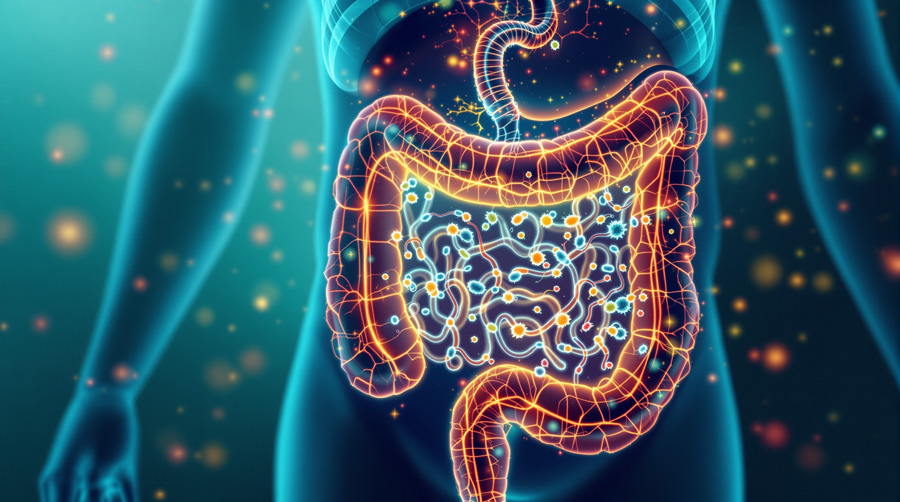Understanding the Gut Microbiome and Digestive Health

Your digestive system houses a complex ecosystem of trillions of microorganisms collectively known as the gut microbiome. This bustling community of bacteria, fungi, viruses, and other microscopic organisms plays a crucial role not just in digestion, but in your overall health and wellbeing.
What Exactly Is the Gut Microbiome?
Think of your gut microbiome as a thriving metropolis with over 1,000 different species of bacteria alone, each performing specialized functions that help keep your body operating smoothly. These microorganisms outnumber your human cells by about 10 to 1, making you more bacterial than human!
While this might sound alarming, the majority of these microbes are beneficial and essential partners in your health journey. They help break down food, produce vital nutrients, train your immune system, and even influence your mood and mental health.
How Your Microbiome Affects Digestive Health
A balanced gut microbiome is fundamental to proper digestion and nutrient absorption. These friendly bacteria help break down complex carbohydrates that your body can't digest on its own, producing short-chain fatty acids that nourish your gut lining and regulate inflammation.
When your microbiome falls out of balance—a condition called dysbiosis—digestive issues often follow. Common symptoms include bloating, gas, irregular bowel movements, and discomfort. Long-term dysbiosis has been linked to inflammatory bowel diseases, irritable bowel syndrome, and even colorectal cancer.
Beyond Digestion: The Far-Reaching Impact
The influence of your gut microbiome extends far beyond digestion. Research has revealed fascinating connections between gut health and numerous aspects of wellness:
-
Immune function: About 70% of your immune system resides in your gut, where beneficial bacteria help regulate immune responses and protect against pathogens.
-
Mental health: The gut-brain axis is a bidirectional communication network connecting your digestive tract and central nervous system. Your gut microbes produce neurotransmitters like serotonin and GABA that influence mood, anxiety, and stress responses.
-
Heart health: Certain gut bacteria can convert compounds in red meat and eggs into substances that may increase risk of cardiovascular disease.
-
Weight management: The specific composition of your gut microbiome may influence metabolism, appetite regulation, and how your body stores fat.
Factors That Shape Your Gut Microbiome
Your microbiome began forming at birth and continues to evolve throughout your life. Key influences include:
-
Diet: What you eat directly impacts which microbes thrive in your gut. Fiber-rich plant foods feed beneficial bacteria, while highly processed foods can promote harmful species.
-
Medications: Antibiotics, while sometimes necessary, can wipe out beneficial bacteria along with harmful ones. Other medications including acid reducers, NSAIDs, and some diabetes drugs can also alter gut flora.
-
Stress: Chronic stress can reduce microbial diversity and promote inflammation in the gut.
-
Sleep quality: Poor sleep has been linked to unfavorable changes in the gut microbiome.
-
Environment: Everything from where you live to having pets can influence your microbial makeup.
Nurturing Your Gut Microbiome
Fortunately, you have considerable power to positively influence your gut community:
-
Diversify your diet: Aim to eat 30+ different plant foods weekly. Each type of fiber feeds different beneficial bacteria, so variety is key.
-
Embrace fermented foods: Yogurt, kefir, sauerkraut, kimchi, and kombucha contain live beneficial bacteria that can take up residence in your gut.
-
Consider prebiotic foods: Garlic, onions, leeks, asparagus, bananas, and oats contain specific fibers that nourish beneficial bacteria.
-
Limit gut disruptors: Reduce artificial sweeteners, emulsifiers (common in processed foods), and excessive alcohol, all of which can disturb microbial balance.
-
Manage stress: Practices like meditation, deep breathing, or regular physical activity help maintain a healthy gut-brain connection.
-
Prioritize sleep: Aim for 7-9 hours of quality sleep to support optimal gut function.
-
Get outside: Exposure to natural environments introduces beneficial microbes and reduces stress.
Signs Your Gut Needs Attention
Your body often sends clear signals when your gut microbiome is out of balance. Watch for:
- Persistent digestive issues like bloating, gas, or irregular bowel movements
- Food intolerances
- Unexpected weight changes
- Fatigue or sleep disturbances
- Skin irritations like eczema
- Autoimmune conditions
- Frequent food cravings, especially for sugar
While occasional digestive discomfort is normal, persistent symptoms warrant attention and possibly professional guidance.
The Road to a Healthier Gut
Improving your gut microbiome isn't an overnight process—it's a journey. Small, consistent changes to diet and lifestyle can lead to significant improvements over time. Remember that each person's microbiome is unique, so what works best may vary from person to person.
Listen to your body, pay attention to how different foods make you feel, and consider working with a healthcare provider or nutritionist who specializes in digestive health if you're experiencing persistent gut issues.
Your microbiome is remarkably resilient and responsive to positive changes. With thoughtful care, you can cultivate a diverse, balanced gut community that supports not just digestive health, but your overall vitality and wellbeing.
Comments
Comments are disabled for this article.